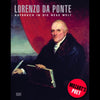Lorenzo Da Ponte Aufbruch in die Neue Welt
Pressedownload
Der Pressedownload darf nur im Zusammenhang mit einer Buchbesprechung verwendet werden. Für die Illustration einer Buchbesprechung können nur bis zu drei Bilder genutzt werden. Für andere Textformate und Nutzungszwecke (wissenschaftliche Vorträge, Werbung oder ähnliches) bitten wir Sie, vorab mit uns in Kontakt zu treten, um mögliche Fragen zu Honorarkosten, Nutzungsund Urheberrechten zu klären. Die bereitgestellten Bilddaten dürfen nicht manipuliert, beschnitten oder zweckentfremdet verwendet werden. Die Pressebilder dürfen nur mit dem vollständigen Bildtitel, dem Namen des Künstlers und/oder Urhebers sowie mit dem Hinweis auf den Hatje Cantz Verlag veröffentlicht werden. Bitte beachten Sie außerdem im Einzelfall die Reproduktionsbedingungen der VG Bild-Kunst Bonn bzw. der internationalen Verwertungsgesellschaften für Bildende Kunst.
Lorenzo Da Ponte
Italian opera librettist Lorenzo Da Ponte (1749-1838) wrote history along with Mozart. However, Da Ponte himself has only been weakly illuminated by the light shone upon their composer and the duo's "co-productions," The Marriage of Figaro, Don Giovanni, and Così fan tutte. This publication is the first to concentrate wholly upon Da Ponte's work and the wild history of his life, which went from Venice and Vienna to London and New York. Special attention is paid to the way his work was received, up to the "Aryanization" of both Da Ponte and Mozart during the Nazi era. The volume sheds light upon an exciting chapter of cultural, musical, and literary history between a Jewish background and Christian surroundings, aristocratic salons and bourgeois identity, and the Old and New Worlds. Lorenzo da Ponte (born in Ceneda, Italy, in 1749, died 1838 in New York), was born as Emanuele Conegliano into a Jewish family. He took on his new name when his father and the rest of the family converted to Catholicism in 1763. Ordained a priest in 1773. Taught classical literature as of 1774. After moving to Vienna in 1783, Joseph II named him the court's dramatic poet. He wrote libretti for a series of composers, including Antonio Salieri and Joseph Weigl, and became famous for his texts for three of Mozart's operas. Became an impresario at the King's Theatre in London in 1793. In 1805 he moved to New York, where he was named professor for Italian literature at Columbia College. Exhibition schedule: Jüdisches Museum Wien March 22-September 17, 2006



